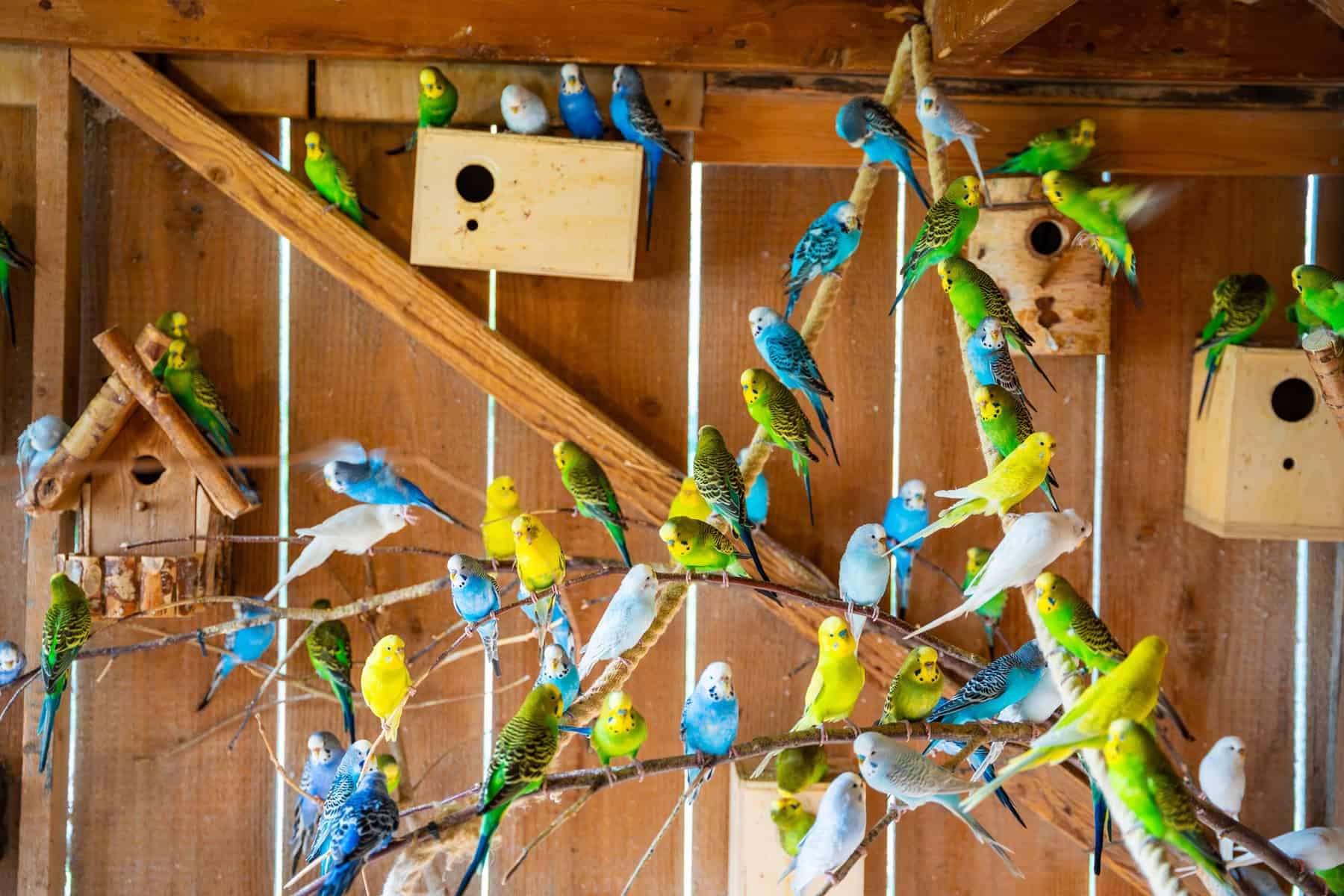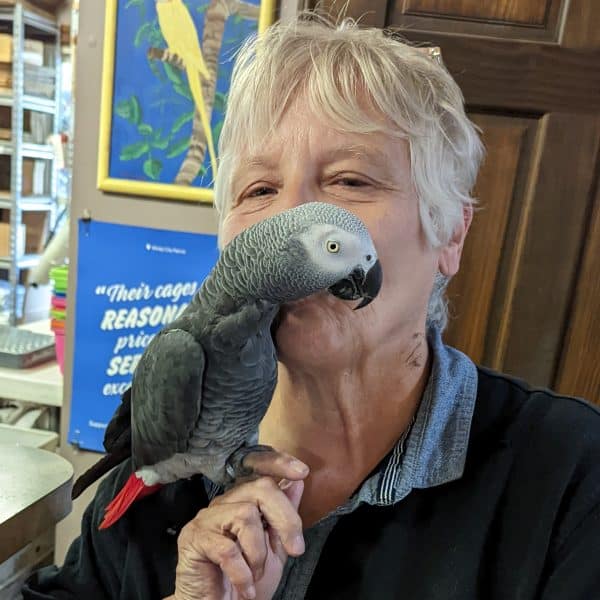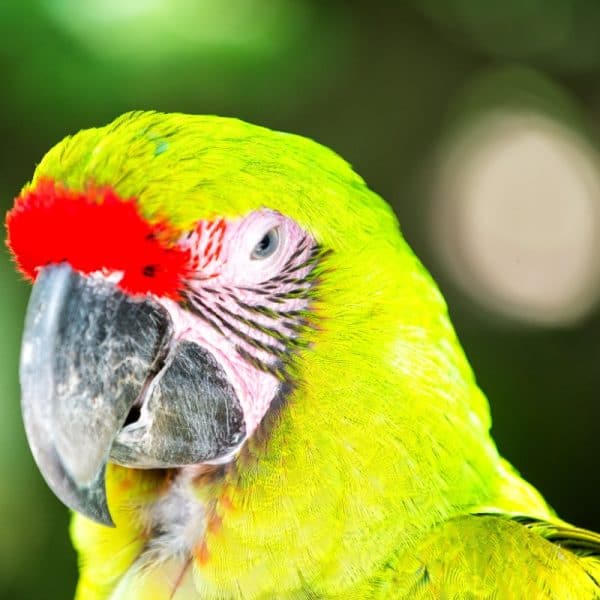Last Updated on by Mitch Rezman
(budgies weigh the same as 2 Reese’s peanut butter cups – btw)
Question about a Male parakeet.
Every time I put my arm in the cage he attacks it, or he flies at me when I look in the cage.
My female looks depressed, like she would rather he move out. She use to be so happy. I got her first, then him a couple months after.
She would sing, and play with her toys. Now all she does is sit on the same perch, and doesn’t hardly move. He doesn’t seem to fight with her.
He just likes to attack me. Do you think I should take him to a pet shop to find him a new home? I just had him for 4 months.
I just don’t know what to do. Can female parakeets get along together? Thought I would take him to the pet store, then get another parakeet. Thank you
Hi Katheryn,
Let’s start by not putting your arm in the cage. You are invading the birds territory and he doesn’t appreciate it.
Make a point of every time you walk by the cage drop a treat in his food dish or a separate treat cup so that he begins to associate good things happening when you come by.
How many toys do you have in the cage? The reason it’s important, especially to new birds is that having many toys in the cage, the birds can have privacy areas of their own.
It is also important to have two water dishes and two food dishes so one does not block the other and starve one of the birds out.
“Swapping” out birds is not the solution to your problem because nobody can predict the behavior of the next bird. We don’t like to treat pets as “disposable”
There’s no reason your birds can’t get along other than the way your cages are set up. They need to be ramped up I would also introduce a millet spray – every day – <- note daily millet that they can share without getting too close to one another as a form of socialization
Proper budgie birdcage set-up video
My budgies are scared of me because I had to pick them to put them in their cage. What should I do to make them not afraid of me?
Budgies can be skittish (as many captive birds can be) until they get to know you. Start by clipping their wings so they don’t fly away when out of the cage.
Don’t try to take them out of the cage, instead, lure them out. One of the best tools to tame budgies is millet.
Once out of the cage make sure they have their own play area where they can enjoy playtime while watching you.
Make all your interactions positive especially when putting them back in the cage.
It’s best to have lighting over the bird cage on a time for 12 hours of light and 12 hours of darkness to help keep their circadian rhythms synchronized
New Topic
I think my alexandrine parakeet is egg-bound but I don’t know if I am sure.
She has been laying eggs for 15 days now.
There are 4 eggs currently that she is tending to. So maybe that is how the bottom of an egg laying parakeet looks like?
A little red but that’s it. She is active and eats healthy not at all depressed. Thankfully but I’m still worried.
I can’t inspect her as she is insistent on sitting on her eggs and not getting up at all (gets very protective if I try to pick her up) Her poops are neither that wet nor too dry.
Hello Zee
It is important that you set her up and examine her. Hold her head between your index finger and her middle finger so she cannot bite you – Then cradle her body in the palm of your hand so you can examine her
Unless you have an expert eye only a veterinarian can determine if a bird has an egg stuck.
You should remove the eggs she is laying on and the nest box – all it does is encourage further brooding activities.
If she lays more eggs just pick them up and throw them out.
I hope this information helps.
Identification
- Abdominal straining
- Bobbing or wagging of the tail
- Drooping of the wings (canaries)
- Wide stance
- Depression
- Loss of appetite
- Lameness or leg paralysis (the egg puts pressure on the nerves going to the legs)
- Distended abdomen
- Droppings stuck to the vent area (the bird cannot raise her tail when passing waste)
- Fluffed feathers
- Weakness
- Difficult breathing (the retained egg puts pressure on the air sacs)
- Sitting on the floor of the cage
- Possible prolapse of part of the reproductive tract (the inner part of the reproductive tract is pushed out so that it is visible as a pink mass protruding from the cloacal opening)
- Occasionally sudden death
The treatment will depend on the condition of the bird, the severity of the signs, where the egg is located, and the length of time the bird has been egg-bound.
This condition is more serious in smaller birds (canaries and finches) who may die within a few hours if not treated.
For a bird that shows a minimum of depression, treatment may include:
- Elevation of the humidity and increasing the environmental temperature to 85-95°F
- Lubrication of the vent
- Injection of calcium, and possibly vitamins A, D, and E, and selenium (vet care)
- Administration of fluids and dextrose
- Injection of oxytocin or arginine vasotocin, or application of a prostaglandin gel. These medications cause contraction of the reproductive tract and may result in the passing of the egg. They should not be used if an obstruction is present.
- Continued access to food and water
Written by Mitch Rezman
Approved by Catherine Tobsing
Author Profile
Latest entries
 Feeding Exotic BirdsDecember 29, 2025How to Switch or Convert Your Bird From Seeds to Pellets: Real-Life Case Studies and Practical Guidance
Feeding Exotic BirdsDecember 29, 2025How to Switch or Convert Your Bird From Seeds to Pellets: Real-Life Case Studies and Practical Guidance Feeding Exotic BirdsDecember 16, 2025A Practical, Budget-Smart Guide to Feeding Birds Well
Feeding Exotic BirdsDecember 16, 2025A Practical, Budget-Smart Guide to Feeding Birds Well Bird EnviornmentsDecember 7, 2025Understanding Budgie Cage Bar Orientation: Myths, Realities & Practical Solutions for Vertical-Bar Bird Cages
Bird EnviornmentsDecember 7, 2025Understanding Budgie Cage Bar Orientation: Myths, Realities & Practical Solutions for Vertical-Bar Bird Cages Feeding Exotic BirdsDecember 5, 2025How Dr. T.J. Lafeber Rewrote the Future of Pet Bird Nutrition
Feeding Exotic BirdsDecember 5, 2025How Dr. T.J. Lafeber Rewrote the Future of Pet Bird Nutrition



